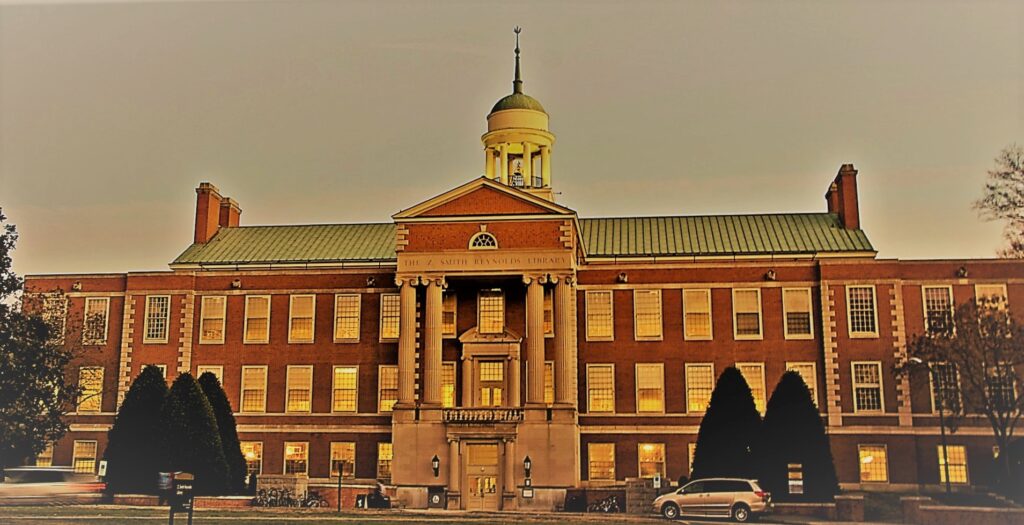Green the Library: ZSR’s Amanda Kaufman talks science misinformation, sustainability, and seeds

You might not think of libraries as bastions of sustainability. But Wake Forest’s beloved Z. Smith Reynolds library is a unique, constantly evolving entity, and this quality extends to its sustainable practices. From providing information literacy courses for undergraduates, to hosting low-waste events, to refurbishing books instead of replacing them, ZSR library and the faculty and staff who run it are going more and more green each day. ZSR Learning and Instructional Services Librarian and CEES affiliate Amanda Kaufman has been heavily involved in these efforts.
When Kaufman came to Wake Forest nine years ago, she had no interest or background in sustainability. “I think a lot of what I’ve learned about sustainability has come from working here and interacting with the Office of Sustainability and other parts of campus,” she says. Kaufman teaches LIB100, the library’s introductory information literacy class. In 2017 Kaufman participated in the Magnolias Curriculum Project, a joint effort of CEES and the Office of Sustainability that incentivizes and teaches Wake Forest faculty to incorporate sustainability into their courses. Her experience opened her eyes to the sustainability initiatives happening on campus and in Winston Salem and pushed her to make links between her LIB100 course, the environment, and our community.
Kaufman’s course teaches students how to discern whether the information they encounter online is real or misinformation, skills that are directly relevant to understanding climate change. “One example we use a lot in my classes is how fossil fuel companies and lobbying groups influence the conversation,” she explains. “I really want my students to question why people doubt things about climate change. What forces are at work in our society that is causing people to distrust good information?”
Beyond her teaching, Kaufman is helping to weave an ethos of sustainability into the library’s operations as a member of ZSR’s Wellness and Sustainability Committee. The committee’s efforts to date have reduced the amount of waste produced and increased the amount of plant-forward food served at library events. And with help from the Office of Sustainability, the compostable tableware and forest green composting bins you have probably seen elsewhere on campus are now common sights at library functions, too.
“I really want my students to question why people doubt things about climate change. What forces are at work in our society that is causing people to distrust good information?”
Kaufman says it hasn’t been easy to make these changes, but they are happening little by little as sustainability becomes ingrained in Wake Forest campus life. She and Brian Cohen of the Office of Sustainability, along with ZSR’s Head of Acquisitions and Description, Jeffrey Eller, recently published a chapter in the book Libraries and Sustainability: Programs and Practices for Community Impact describing what they’ve learned along the way. This is important because, while sustainability is a core value of the American Library Association, many librarians don’t know how to implement more sustainable practices in their day-to-day work.
Kaufman’s dream is to make ZSR a place that provides more items than just books to the Wake Forest community. “I would love for us to be a seed library,” she says. Distributing vegetable and flower seeds is something other university libraries are already doing, mainly those at larger public schools like the University of North Carolina – Chapel Hill. Seed libraries allow people to “check out” seeds to take home (or back to their dorm room) and plant, then harvest the benefits. There are still a few kinks to work out before a ZSR seed library could become reality – among them, figuring out which seeds grow best in the limited space and light of a dorm room – but the idea is promising.
While the quest to find a dorm-friendly seed continues, ZSR will continue to build its sustainability credentials. And with Kaufman on board, rest assured they’ll do this the Wake Forest way: through impactful teaching and leading scholarship.

